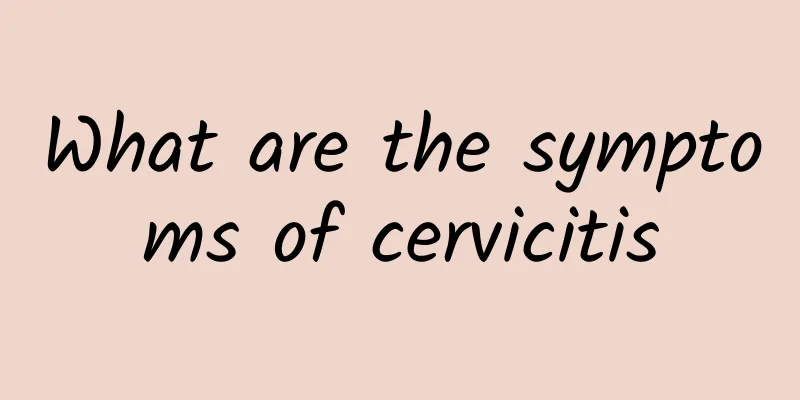What are the symptoms of cervicitis

|
Cervicitis refers to inflammation of the cervix, which can be acute or chronic. Symptoms of cervicitis usually include vaginal pain or discomfort, abnormal discharge, abnormal lesions, contact bleeding, local pain in the lumbosacral region, pelvic cavity, and lower abdomen. It is recommended to seek medical attention promptly when these symptoms occur, and choose appropriate medications according to the type of infecting pathogens. Commonly used treatments include antibiotics, antifungal drugs, antiviral drugs or other anti-infective drugs, such as penicillin, itraconazole, ribavirin, etc. The specific introduction is as follows: 1. Vaginal pain or discomfort: Cervicitis may cause itching, burning, or irritation in the vaginal area. These sensations may cause discomfort or worsen. 2. Abnormal discharge: Cervicitis may cause changes in vaginal discharge. These discharges may increase in volume, become sticky, or appear in abnormal colors such as white, yellow, green, or gray. The discharge may also have an odor. 3. Abnormal lesions: Cervicitis may cause abnormal lesions on the cervix, such as cervical columnar epithelial ectopia or cervical polyps. Cervical columnar epithelial ectopia or polyps may cause bloody leucorrhea or bleeding after sexual intercourse. 4. Contact bleeding: For example, after a gynecological examination or sexual intercourse, contact bleeding occurs due to local irritation to the cervix. 5. Local pain in the lumbosacral region, pelvic cavity, and lower abdomen: When inflammation spreads along the uterosacral ligament to the pelvic cavity, there may be pain in the lumbosacral region, a feeling of heaviness in the lower abdomen, and dysmenorrhea, which worsens during defecation and sexual intercourse. In rare cases, severe cervicitis may also cause local pain in the lumbosacral region, pelvic cavity, and lower abdomen. Some patients may not have any symptoms or very mild symptoms. Since everyone's physique and situation are different, the symptoms of cervicitis are not exactly the same. If the above symptoms persist or multiple symptoms exist at the same time, it is recommended to seek medical attention in time. While cooperating with the doctor's treatment, pay attention to maintaining good living habits and hygiene habits to reduce the aggravation and recurrence of inflammation. At the same time, you should also get enough sleep and avoid staying up late and overly stressful lifestyles. |
<<: Is it better to have an abortion or a medical abortion?
>>: Why haven't I had my period yet 51 days after having an abortion?
Recommend
Stay away from cervicitis and start by understanding the symptoms.
Cervicitis is a common gynecological disease that...
South Korean oysters found to contain toxic bacteria, health agency to destroy all
In early June, it was reported that people in the...
Beat body fat! 3 sports myths you should know
I'm clearly trying hard to lose weight, but w...
What is the cause of second-degree cervical erosion in women? Second-degree cervical erosion is caused by 5 reasons
The cervix is a unique part of a woman's bo...
How to deal with the overwhelming pressure of epidemic prevention? 5 minutes of aerobic exercise every day can help relieve anxiety and depression symptoms
During the epidemic, many office workers work fro...
What are the precautions for cervicitis?
What are the precautions for cervicitis? Whether ...
Symptoms of incomplete miscarriage after abortion
Nowadays, people live too openly. In order to get...
Say goodbye to edema! 2 Yoga moves to slim your butt and legs
Supermodel Wang Liya shares some yoga stretching ...
Will abnormal vaginal discharge affect pregnancy?
Abnormal vaginal discharge may affect pregnancy, ...
Will women with cervical erosion bleed during pregnancy? Some suggestions for women with cervical erosion
There are many mucous membranes on the surface of...
What Chinese medicine can cure uterine fibroids? What Chinese medicine can cure uterine fibroids?
What Chinese medicine can cure uterine fibroids? ...
Early care of vulvar leukoplakia
Early care of vulvar leukoplakia is very importan...
What to do if you eat too much fat? 7 secrets to cleanse the intestines and get rid of fat
After eating a lot of meat and fish for 6 consecu...
What are the common symptoms of uterine fibroids?
Uterine fibroids are a common gynecological disea...
Treatment methods for uterine fibroids High-risk groups for uterine fibroids
Uterine fibroids are a common female disease. Now...









